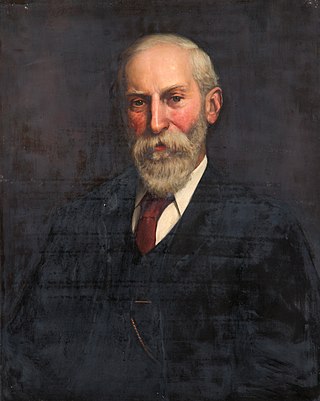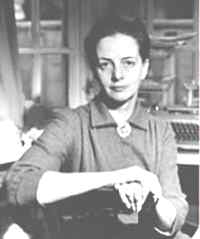Related Research Articles

Joseph Rudyard Kipling was an English journalist, novelist, poet, and short-story writer. He was born in British India, which inspired much of his work.

William Ernest Henley was an English poet, writer, critic and editor. Though he wrote several books of poetry, Henley is remembered most often for his 1875 poem "Invictus". A fixture in London literary circles, the one-legged Henley might have been the inspiration for Robert Louis Stevenson's character Long John Silver, while his young daughter Margaret Henley inspired J. M. Barrie's choice of the name Wendy for the heroine of his play Peter Pan (1904).

"If—" is a poem by English poet Rudyard Kipling (1865–1936), written circa 1895 as a tribute to Leander Starr Jameson. It is a literary example of Victorian-era stoicism. The poem, first published in Rewards and Fairies (1910) following the story "Brother Square-Toes", is written in the form of paternal advice to the poet's son, John.
The Oxford University Press published a long series of poetry anthologies, dealing in particular with British poetry but not restricted to it, after the success of the Oxford Book of English Verse (1900). The Oxford poetry anthologies are traditionally seen as 'establishment' in attitude, and routinely therefore are subjects of discussion and contention. They have been edited both by well-known poets and by distinguished academics. In the limited perspective of canon-formation, they have mostly been retrospective and well-researched, rather than breaking fresh ground.
These are Oxford poetry anthologies of English poetry, which select from a given period. See also The Oxford Book of Twentieth Century English Verse and Eighteenth century women poets: an Oxford anthology.

Edward Lyulph Stanley, 4th Baron Sheffield, 4th Baron Stanley of Alderley and 3rd Baron Eddisbury PC was an English peer.

The MacDonald sisters were four English women of part-Scottish descent born during the 19th century, notable for their marriages to well-known men. Alice, Georgiana, Agnes and Louisa were the daughters of Reverend George Browne Macdonald (1805–1868), a Wesleyan Methodist minister, and Hannah Jones (1809–1875).

Marghanita Laski was an English journalist, radio panellist and novelist. She also wrote literary biography, plays and short stories, and contributed about 250,000 additions to the Oxford English Dictionary.

"Danny Deever" is an 1890 poem by Rudyard Kipling, one of the first of the Barrack-Room Ballads. It received wide critical and popular acclaim, and is often regarded as one of the most significant pieces of Kipling's early verse. The poem, a ballad, describes the execution of a British soldier in India for murder. His execution is viewed by his regiment, paraded to watch it, and the poem is composed of the comments they exchange as they see him hanged.

William Henry Heinemann was an English publisher of Jewish descent and the founder of the Heinemann publishing house in London.
Nationality words link to articles with information on the nation's poetry or literature.

Charles Whibley was an English literary journalist and author. In literature and the arts, his views were progressive. He supported James Abbott McNeill Whistler. He also recommended T. S. Eliot to Geoffrey Faber, which resulted in Eliot's being appointed as an editor at Faber and Gwyer. Eliot's essay Charles Whibley (1931) was contained within his Selected Essays, 1917-1932. Whibley's style was described by Matthew as "often acerbic high Tory commentary".

Charles Wolcott Balestier was a promising American writer, editor, and publisher who died young, and is now remembered primarily for his connection to Rudyard Kipling. His sister Carrie Balestier married Kipling in 1891.

Rye House in Hoddesdon, Hertfordshire is a former fortified manor house, located in what is now the Lee Valley Regional Park. The gatehouse is the only surviving part of the structure and is a Grade I listed building. The house gave its name to the Rye House Plot, an assassination attempt of 1683 that was a violent consequence of the Exclusion Crisis in British politics at the end of the 1670s.

Walter Herries Pollock was an English writer, poet, lecturer and journalist. He is best known as editor of the Saturday Review, a position he held from 1884 to 1894, but also had published various miscellaneous writings that included novels, short stories, plays, poetry and translated works between 1877 and 1920. He was also, at one time, considered one of the best amateur fencers in Great Britain.
Vincent George Dowling (1785–1852) was an English journalist. He was an influential figure in the development of sports journalism, who also worked covertly as a government informer.
James Edmund Vincent was a Welsh barrister, known as a journalist and author.
The Ludgate Monthly was a London-based monthly magazine, which published short fiction and articles of general interest. There were 118 issues from May 1891 to February 1901; the magazine then merged with The Universal Magazine.

James Nicol Dunn was a Scottish journalist and newspaper editor, best known as the editor of London newspaper The Morning Post from 1897 to 1905 and as London editor of the Glasgow Evening News from 1914 until his death in 1919.

Robert Fitzroy Bell was a Scottish publisher and advocate. In 1884 he founded the students' representative council (SRC) at the University of Edinburgh.
References
- 1 2 3 4 "William Ernest Henley". Encyclopædia Britannica . britannica.com. Retrieved 16 June 2020.
- ↑ "Dunn, James Nicol, (12 Oct. 1856–30 June 1919), London Editor Glasgow News since 1914". WHO'S WHO & WHO WAS WHO. 2007. doi:10.1093/ww/9780199540884.013.u195882 . Retrieved 11 November 2020.
- ↑ Wintersgill, Donald. "Bell, Robert Fitzroy". Oxford Dictionary of National Biography (online ed.). Oxford University Press. doi:10.1093/ref:odnb/100753.(Subscription or UK public library membership required.)
- ↑ Lee, Sidney, ed. (1912). . Dictionary of National Biography (2nd supplement). Vol. 3. London: Smith, Elder & Co.
- ↑ Warsop, Keith (2004). The Early F.A. Cup Finals and the Southern Amateurs. Tony Brown, Soccer Data. pp. 112–113. ISBN 1-899468-78-1.Parr had played in the 1880 FA Cup Final.